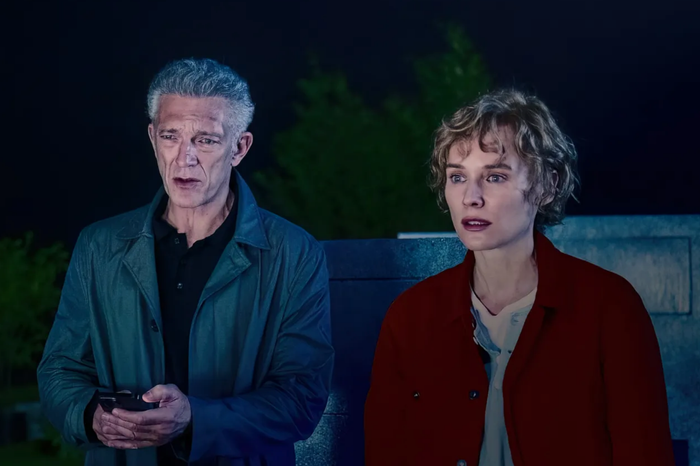
In David Cronenberg’s The Shrouds, emotions manifest themselves through changes to the body. A man bleeds because he’s nervous. Grief rots the teeth. And love, in one of the film’s more startling images, seems to mimic the effects of a late-stage terminal disease. There is talk of religion, but the film’s protagonist, Vincent Cassel’s Karsh Relikh, made up to look like Cronenberg himself, insists that he’s an atheist. But he does believe in an afterlife. Or, maybe more accurately, an afterdeath: Karsh has developed a technology that will allow him to watch his beloved late wife’s body decay in the grave, and he wants to share it with the world.
That’s the “shroud” of the title: a nifty piece of engineered cloth outfitted with many tiny X-ray cameras that is placed in the deceased’s coffin, allowing their loved ones to watch them slowly rot away. It was born out of Karsh’s anguished desire to enter his wife Bekka’s (Diane Kruger) coffin and be buried alongside her, but now it’s part of his funereal tech empire. Someone asks him about the Shroud of Turin early on; he reminds them that the ancient relic that purported to capture the face of Jesus was a fake. But Relikh’s shrouds are real. As someone who doesn’t believe in a spiritual concept of the self, maybe this is his answer to religion: If our emotions are our bodies, then perhaps, in watching our bodies decompose, we can truly reveal a secular version of the soul.
The Shrouds is clearly a very personal film for Cronenberg, who has spoken openly of the pain of losing his wife to cancer several years ago. But then again, Cronenberg makes personal films. Movies like A Dangerous Method and Crimes of the Future don’t happen because someone wants to make a quick buck. I will admit to not being a fan of the director’s later efforts (I prefer the earlier, funnier ones), but it feels like a gift to the world that he keeps making them, pursuing his own twisted muse no matter where it takes him.
Cronenberg has always been fascinated by control, and The Shrouds really goes to town on the idea. Early in the film, Karsh goes on a blind date with a woman who tells him she lives in a house designed by her architect ex-husband. The date itself was “engineered” (I’m pretty sure that’s the word used) by Karsh’s dentist. But of course, Karsh has one-upped them all: He owns the restaurant where they’re meeting, which also happens to be in a cemetery that is also partly his. Later, Karsh’s mess of a brother-in-law, Maury (a very funny Guy Pearce), who seems to be both financially and emotionally adrift in the wake of his divorce from Bekka’s sister, Terry (also Kruger), will attempt to exert his own power over the narrative. Kruger also shows up as the voice of Hunny, an artificially intelligent avatar placed inside Karsh’s phone, who seems able to playfully change attitudes and shapes based on how Karsh is feeling — but is he controlling her, or is she controlling him? And when Karsh finally begins to experience something resembling love again, questions hang in the air: Who made this happen? Was this affection also engineered? You see, even we atheists wrestle with the question of free will.
Unfortunately, The Shrouds, for all the many ideas floating around in it, feels more like a series of interesting notes for a film than an actual feature. Some of the plot involves Karsh’s attempts, with Maury’s help, to investigate an act of vandalism that happens in his futuristic cemetery. Some of it involves a series of alarming growths he discovers on his wife’s bones: Did somebody put them there, or did they organically spring up? There is talk of industrial espionage, the possibility of using the shroud tech as a broader surveillance system, and some suspicions about whether Bekka died of natural causes. There’s adultery and cuckoldry and suspicions of adultery and cuckoldry and doubles and all the other good Cronenbergian ideas. But none of it really fits together. And most of it — save for one fantastically intense sex scene — is talk, delivered with such obviousness that the artistry is absent. Much of The Shrouds could be a video essay someone made about a really interesting Cronenberg film called The Shrouds.
The parts that do resonate feel like physical metaphors ripped out of real life. In flashbacks that intrude on his present, Karsh relives the affection he shared with Bekka during her illness as she progressively loses more parts of her body and an embrace could result in a bone fracture. When we talk of love, we like to talk of tenderness; Cronenberg, ever the master of spiritual wordplay, asks us to interrogate that idea — the notion that adoration and fragility are so intertwined — and takes it to its logical, symbolic, and physical extremes. He does so, I suspect, because aging and illness (in ourselves and our loved ones) will eventually force most of us into that dark nexus. Cronenberg is transmitting to us from the borders of death, behind the enemy lines of inconsolable grief. And the man’s mind is still so alive that it seems churlish to ding this movie for being so — God, this isn’t the word I want to use, but I must — lifeless. Sadly, the inertia eventually gets to us.
More From the 2024 Cannes Film Festival
- There’s Horror Lurking Under Becoming a Guinea Fowl’s Absurdist Humor
- A Night Out With the Strippers of Sean Baker’s Anora
- It’s No Wonder That Everyone Falls for Anora


